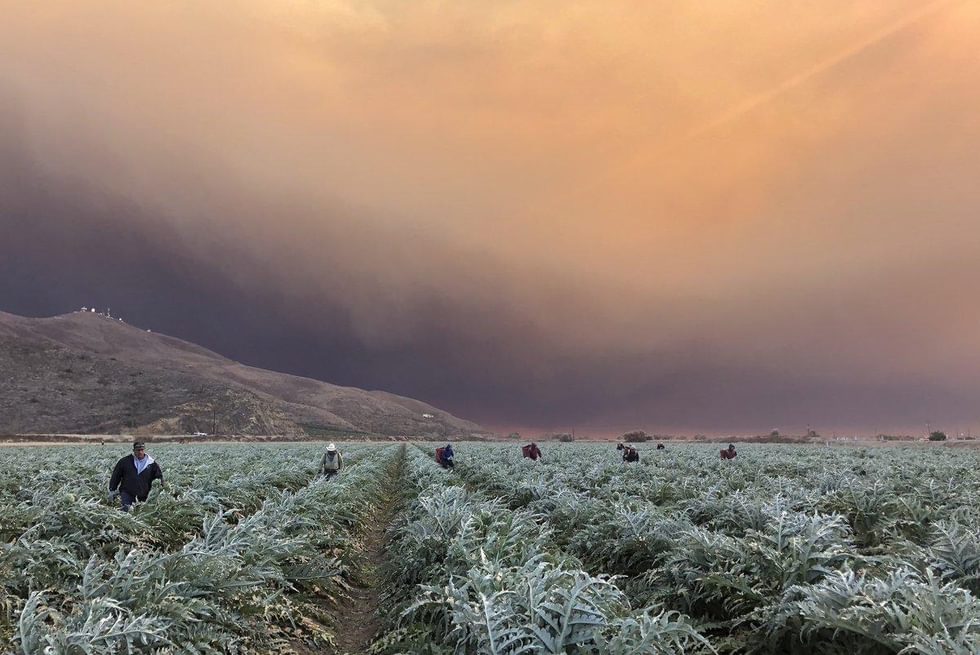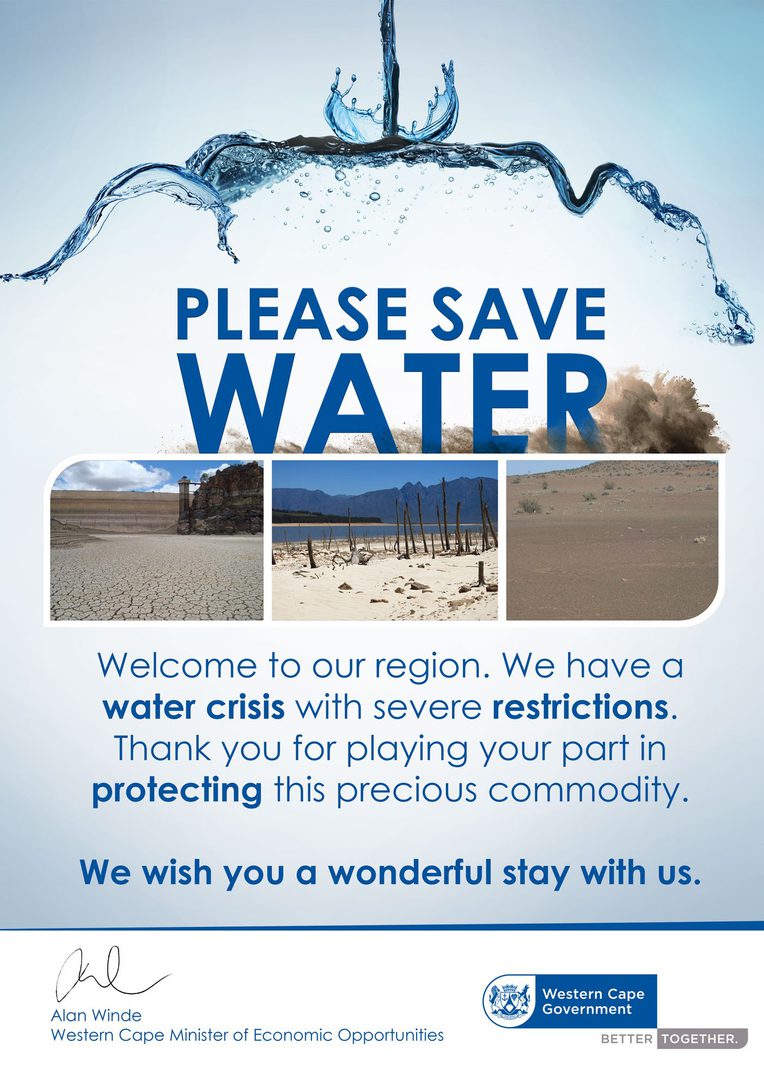Governing through Eco-Anxiety
From the Series: Green Capitalism and Its Others
From the Series: Green Capitalism and Its Others

A recent NASA satellite image identifies the South African province of Mpumalanga as a global hotspot for emissions linked to coal burning plants and oil refineries, some of the planet’s biggest polluters that locals blame for a range of health problems. Dwindling water resources, which government agencies connect to climate change–induced drought, is another sign of the times, visibly so during the 2018 “Day Zero” crisis that threatened to make Cape Town the world’s first major city to run out of water. In South Africa’s highly stratified energy hubs and water scarce cities, private entities are increasingly shaping climate debates, notably through advertising campaigns, “green” research and development, and large-scale infrastructure projects. What unites these phenomena, in part, is efforts by various actors to heighten or deescalate, but ultimately draw from the economically and politically productive power of fear over insecure and changing environments. South African social media and blog posts, often citing the American Psychological Association definition (“chronic fear of environmental doom”) gloss these diverse idioms of fear as “eco-anxiety.”
Eco-anxiety, in a growing scholarly literature, cuts across Freudian distinctions between distress over immediate existential threats, dread over possible future injuries or harm, post-trauma from past disasters, and self-punishing guilt or shame. In these ways, eco-anxiety centers on negative transformations in what Gregory Bateson (1979) calls the “eco-mental system”: how people connect to their homes, bodies, and local ecologies amid industrial pollution or climate effects, which can contribute to a loss of determined place in the world or an unearthing of vulnerabilities, most acutely in marginalized communities (Albrecht et al. 2007). Scholars agree that eco-anxiety is expressed, not merely as conscious or articulated distress, but through practices and interactions tied to the environmental milieus in which they were produced “within and beyond the perimeter of the body” (Buell 2009) between domains of the actively noticed and the taken-for-granted. Studies find that eco-anxious subjects often engage in moral self-governing that point to “the regulatory failure of the neoliberal state” (Cossman 2013, 1), which is framed, in turn, as untrustworthy of protecting bio-citizens from ecological threats (Petryna 2018). While the emic term eco-anxiety refers to an alleged public fear and affective state within popular discourses about environmental crisis, I use the term “eco-anxiety governance” to characterize efforts of using, managing, escalating, grounding, and profiting from that mood toward certain ends and often against certain subjects.

In South Africa, advertising campaigns maximize the productive currency of eco-anxiety by creating “good subjects” and “bad subjects” (Death 2016, 204; cf. Olma, this series). Mpumalanga energy companies produce sleek online ads and brochures that emphasize sustainability, climate change mitigation, a lower carbon economy, and—tax deductible—community conservation projects. Other PR campaigns, one backed by a paid study, attribute air pollution to the burning of household fuels and densified shack building by poor communities (“bad subjects”). These PR moves aim at reducing fear of emissions by positing threats as contained and controllable through future-oriented, corporate-led “green” R&D. Other campaigns actively seek to escalate eco-anxiety to cultivate desire for belonging, at times, via commodities. Cape Town’s “Day Zero” is a viral “awareness” campaign to save water created politicians, scientists, and PR experts. By all appearances, the PR worked: the city reduced household consumption by 50 percent. Websites shamed water wasters, while ads swept the city selling “Jo-Jo” water storage tanks, borehole water drilling, and other in/formal “green” technologies that the wealthiest used to supplement or leave the municipal water grid. Promising to ameliorate fear can be lucrative, be it for investors or insurers, or even fundraising NGOS. During “Day Zero,” the city built three controversial desalination plants, public–private projects that expected a return, while poor residents worried funds would be diverted from those who ordinarily lived without formalized water infrastructure. Protests ensued.

Eco-anxiety often mirrors anxiety about other social processes (Comaroff and Comaroff 2001), in this case, fears about mass urban migration from rural areas and elsewhere on the continent, newly legitimated under the rubric of securing environmental resources. Eco-anxiety can be used for eco-austerity in a post-apartheid state. Green infrastructure, while ripping new opportunities for capital, evoke memories and continuities of apartheid (cf. Bruckermann, this series). Rising fears about water in Cape Town helped speed up and intensify policy to install a new generation of “smart,” “green” water meters, largely in race-based townships. Poor families, who did not dismantle them, feared more routine disconnections. “Green” infrastructure like these meters—sold at global eco-fairs—reflect an aligning of the stars between finance capital, biometric surveillance, and digital technologies, with ramifications for law, too. In Mpumalanga, migrant workers who live next to energy industries sign anxiety-inspiring indemnity forms when they arrive to work, which specifies nondisclosures about accidents and absolving plants for injuries. In the absence of other protections, some women wear makeshift pads each day in hopes they will prevent the chemicals from entering their vaginas and protect against infertility. The women say that the plants are drying up not only their wombs, but also the local water supply. Those living at the literal coal-face, through very real fear, are making novel connections between exposure to chemical toxicity and climate risks that raise the question about the sustainability of life in cities, or what it means to survive an ecological crisis, which demand alternative modes of being human. The possible extinction of cities, the ultimate eco-anxiety that has mobilized student movements, scientists, and evangelist churches alike, is a reflection upon changing human/non-human relations after apartheid, which at once harkens back to colonial projects with its foundations in the exploitation of particular bodies and ecologies and looks forward to new hopes of a viable social life.
Albrecht, Glenn, Gina-Maree Sartore, Linda Connor, Nick Higginbotham, Sonia Freeman, Brian Kelly, Helen Stain, Anne Tonna, and Georgia Pollard. 2017. “Solastalgia: The Distress Caused by Environmental Change.” Australasian Psychiatry 15, no. 1: S95–S98.
Bateson, Gregory. 1979. Mind and Nature: A Necessary Unity. Vol. 255. Cresskill, N.J.: Hampton Press.
Buell, Lawrence. 2009. Writing for an Endangered World. Cambridge, Mass.: Harvard University Press.
Comaroff, Jean, and John L. Comaroff. 2001. “Naturing the Nation: Aliens, Apocalypse and the Postcolonial State.” Journal of Southern African Studies 27, no. 3: 627–51.
Cossman, Brenda. 2013 “Anxiety Governance.” Law and Social Inquiry 38, no. 4: 892–919.
Death, Carl. 2016. “Bodies, Populations, Citizens: The Biopolitics of African Environmentalism.” In The Routledge Handbook of Biopolitics, edited by Sergei Prozorov and Simona Rentea, 204–22. New York: Routledge.
Petryna, Adriana. 2018. “Wildfires at the Edges of Science: Horizoning Work amid Runaway Change.” Cultural Anthropology 33, no. 4: 570–95.